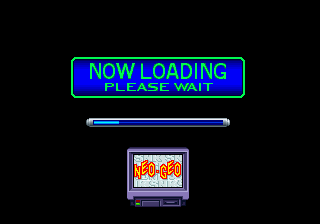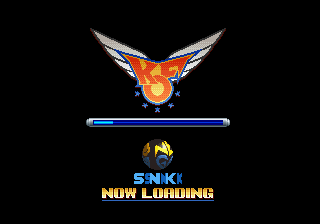Logo file: Difference between revisions
mNo edit summary |
mNo edit summary |
||
| Line 3: | Line 3: | ||
[[File:kof96load.png|frame|KOF 96 custom loading screen (LOGO_E.PRG).]] | [[File:kof96load.png|frame|KOF 96 custom loading screen (LOGO_E.PRG).]] | ||
LOGO files are optional | LOGO files are optional files used to create custom CD loading screens. | ||
The [[system ROM]] loads one of | The [[system ROM]] automatically loads one of the following files according to the console's [[nationality]] setting, if present in the CD's root: | ||
* LOGO_E.PRG for European nationality. | |||
* LOGO_U.PRG for US nationality. | |||
* LOGO_J.PRG for Japanese nationality. | |||
The files must not be larger than 2048 bytes. | The files must not be larger than 2048 bytes. | ||
| Line 11: | Line 15: | ||
=File format= | =File format= | ||
{|class=" | {|class="wikitable" | ||
!Size | |||
!Description | |||
|- | |- | ||
|Word | |Word | ||
|Flags | |||
|- | |||
|Longword | |||
|Data type | |Data type | ||
|- | |- | ||
| | |Longword | ||
|Data pointer | |||
|- | |||
|Longword | |Longword | ||
|Data type | |Data type | ||
|- | |- | ||
|Longword | |Longword | ||
| | |Data pointer | ||
|- | |- | ||
|... | |||
| | |||
|- | |- | ||
|Longword | |Longword | ||
| | |0xFFFFFFFF terminator | ||
|- | |||
|? | |||
|Data previously pointed to... | |||
|} | |} | ||
The first word represents flags: | |||
* Bit 0: If set, do not draw the default 'NOW LOADING please wait' graphic (see picture top right). | |||
* Bit 1: If set, no progress bar is drawn. | |||
* Bit 2: If set, no animation is drawn. | |||
No other bits seem to be checked by the system ROM. | |||
*Offset (longword) $4000 = tile | The rest of the file's contents are "data type - pointer" longword pairs. The type codes used must be sorted in an ascending order. The file is terminated with a $FFFFFFFF type code. The valid type codes are: | ||
*Size (longword) $ | |||
*Tile data... | *1: Fix tiles | ||
*2: Palette | |||
*3: Tile map | |||
*4: Animation map | |||
The pointer values are absolute, starting from $120000. | |||
==Fix tiles data format== | |||
* Offset (longword). Example: $4000 = start at tile #512 | |||
* Size (longword). Example: $2000 = load 256 tiles | |||
* Tile data... | |||
Like the regular [[fix graphics format]], but byteswapped. | Like the regular [[fix graphics format]], but byteswapped. | ||
==Palette data== | ==Palette data format== | ||
* Palette number (word). | |||
* 16 words of [[palettes|color data]]. | |||
Note: The default progress bar seems to use palette 0, be careful not to overwrite it. Remember that fix tiles can only use the 16 first palettes. | |||
==Map data format== | |||
All values are words. | |||
* | * Start fix map address ($7102 is good). | ||
*Width in tiles | * Width in tiles. | ||
*Height in tiles | * Height in tiles. | ||
* | * Fix tilemap data as found in [[VRAM]]... | ||
Note: Mapping is done from left to right, top to bottom. | |||
==Animation map data== | ==Animation map data format== | ||
All values are words | All values are words. | ||
* | * Start fix map address ($7102 is good). | ||
* Width in tiles | * Width in tiles. | ||
* Height in tiles | * Height in tiles. | ||
* Number of frames in animation | * Number of frames in animation. | ||
* Animation speed (in frames) | * Animation speed (in frames). | ||
* | * Fix tilemap data as found in [[VRAM]]... | ||
==Using LOGO files for in-game loading== | ==Using LOGO files for in-game loading== | ||
By default the system ROM will always use the initial LOGO file during in game loading sequences. It is possible to change this by loading | By default the system ROM will always use the initial LOGO file during in game loading sequences. It is possible to change this by loading new data over the buffered LOGO file data at $120000. How this gets loaded is not yet confirmed but its suspected that games request the data to be loaded as it would any other data given there is not need for 'LOGO' to be in the file name in this situation. It may also be possible the system ROM looks out for data being loaded into this region before drawing. | ||
The ability to change the default progress bar (handled by the system ROM) is also available. The system ROM places the start address of its code to handle progress bar drawing at $11C80C. This code is then always called via 'MOVEA.L 0x11C80C,A0', 'JSR(A0)'. To use a custom progress bar simply place the start address of your custom progress bar code at $11C80C. Current progress bar state is held at address $10F691. Your code should handle all elements of drawing the progress bar. | The ability to change the default progress bar (handled by the system ROM) is also available. The system ROM places the start address of its code to handle progress bar drawing at $11C80C. This code is then always called via 'MOVEA.L 0x11C80C,A0', 'JSR(A0)'. To use a custom progress bar simply place the start address of your custom progress bar code at $11C80C. Current progress bar state is held at address $10F691. Your code should handle all elements of drawing the progress bar. | ||
Revision as of 22:47, 11 September 2017


LOGO files are optional files used to create custom CD loading screens.
The system ROM automatically loads one of the following files according to the console's nationality setting, if present in the CD's root:
- LOGO_E.PRG for European nationality.
- LOGO_U.PRG for US nationality.
- LOGO_J.PRG for Japanese nationality.
The files must not be larger than 2048 bytes.
File format
| Size | Description |
|---|---|
| Word | Flags |
| Longword | Data type |
| Longword | Data pointer |
| Longword | Data type |
| Longword | Data pointer |
| ... | |
| Longword | 0xFFFFFFFF terminator |
| ? | Data previously pointed to... |
The first word represents flags:
- Bit 0: If set, do not draw the default 'NOW LOADING please wait' graphic (see picture top right).
- Bit 1: If set, no progress bar is drawn.
- Bit 2: If set, no animation is drawn.
No other bits seem to be checked by the system ROM.
The rest of the file's contents are "data type - pointer" longword pairs. The type codes used must be sorted in an ascending order. The file is terminated with a $FFFFFFFF type code. The valid type codes are:
- 1: Fix tiles
- 2: Palette
- 3: Tile map
- 4: Animation map
The pointer values are absolute, starting from $120000.
Fix tiles data format
- Offset (longword). Example: $4000 = start at tile #512
- Size (longword). Example: $2000 = load 256 tiles
- Tile data...
Like the regular fix graphics format, but byteswapped.
Palette data format
- Palette number (word).
- 16 words of color data.
Note: The default progress bar seems to use palette 0, be careful not to overwrite it. Remember that fix tiles can only use the 16 first palettes.
Map data format
All values are words.
- Start fix map address ($7102 is good).
- Width in tiles.
- Height in tiles.
- Fix tilemap data as found in VRAM...
Note: Mapping is done from left to right, top to bottom.
Animation map data format
All values are words.
- Start fix map address ($7102 is good).
- Width in tiles.
- Height in tiles.
- Number of frames in animation.
- Animation speed (in frames).
- Fix tilemap data as found in VRAM...
Using LOGO files for in-game loading
By default the system ROM will always use the initial LOGO file during in game loading sequences. It is possible to change this by loading new data over the buffered LOGO file data at $120000. How this gets loaded is not yet confirmed but its suspected that games request the data to be loaded as it would any other data given there is not need for 'LOGO' to be in the file name in this situation. It may also be possible the system ROM looks out for data being loaded into this region before drawing.
The ability to change the default progress bar (handled by the system ROM) is also available. The system ROM places the start address of its code to handle progress bar drawing at $11C80C. This code is then always called via 'MOVEA.L 0x11C80C,A0', 'JSR(A0)'. To use a custom progress bar simply place the start address of your custom progress bar code at $11C80C. Current progress bar state is held at address $10F691. Your code should handle all elements of drawing the progress bar.
It appears games plant their custom progress bar code into the default LOGO file as well as any further files that get loaded to this range. Below is the routine used by Samurai Shodown IV as seen in file 'JL_ST1.PRG' once in RAM. The main game program code places 0x120086 to $11C80C
120086 4EF9 0012 4AD0 JMP 0x124AD0124AD0 4DF9 003C 0000 LEA 0x3C0000,A6
124AD6 41F9 0012 4B00 LEA 0x124B00,A0
124ADC 1239 0010 F691 MOVE.B 0x10F691,D1
124AE2 0241 00F0 ANDI.W #0xF0,D1
124AE6 D0C1 ADDA.W D1,A0
124AE8 203C 719B A200 MOVE.L #0x719BA200,D0
124AEE 7E0F MOVEQ #0xF,D7
124AF0 1018 MOVE.B (A0)+,D0
124AF2 2C80 MOVE.L D0,(A6)
124AF4 0680 0020 0000 ADDI.L #0x200000,D0
124AFA 51CF FFF4 DBF D7,*-0xA [0xC00422]
124AFE 4E75 RTS